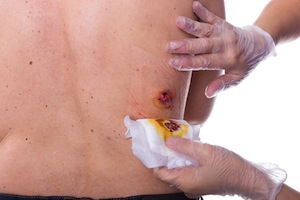 Debridement is a type of wound care that involves removing tissue that has died or become damaged or infected. In some cases, more than one treatment is needed in order to make a wound as clean as possible.
Debridement is a type of wound care that involves removing tissue that has died or become damaged or infected. In some cases, more than one treatment is needed in order to make a wound as clean as possible.
Different Methods
There are a few different ways that a debridement treatment is performed. Here are some of the most common.
- Autolytic – This is where a doctor will use the fluid produced by your wound to separate dead tissue from healthy tissue. In order to keep a wound moist, it will typically need to be covered wit bandages. Proteins in the fluid liquefy dead tissue, which is then washed away during treatment.
- Enzymatic – A type of medicine used to melt away dead or damaged tissue.
- Hypobaric – This consists of a foam bandage and suction tube. The bandage, which is typically clear, creates suction and then the tube pulls out excess fluids and dead tissue. This allows healthy tissue to grow in its place.
- Surgery – A surgical procedure is typically needed when a wound is excessively large or has become infected.
In other cases, doctors may use chemicals such as hydrogen peroxide to kill germs, iodine to dry dead tissue, or hypochlorite to gradually remove dead tissue. There are some instances where whirlpool treatment is used to soften and remove dead tissue, and also increase blood flow to promote faster healing.
Wound Maintenance
Again, you may need to undergo more than one debridement treatment in order to keep your wound as clean as possible. In between appointments, there are several things you end to help it heal. First, keep your wound as clean and dry as possible, and limit movements in order to reduce the risk of tearing and bleeding. Stay out of sunlight, drink liquids as directed, and stop smoking. Smoking reduces blood flow and can delay the healing process.
The Plano debridement professionals with DFW Wound Care Center can help your wound heal as quickly and safely as possible. Call us at 972-665-6292 or 972-318-2383 or contact us online to schedule an appointment.
Contact us
Schedule an appointment
with our specialists by contacting us or calling our:
